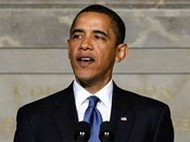Changin course in Cuba: a Road with Many Paths for Obama
- Submitted by: admin
- Editorial Articles
- Politics and Government
- 06 / 30 / 2009

While President Obama's incremental changes in policy toward Cuba are positive, they are also insufficient. Now is the time for decisive and rational efforts to bring Cuba back into full engagement with the economic and political dynamics of the Americas.
For starters, we're still a lot closer to the status quo than to the decisive break from past policies, which is where we need to be. The status quo is a loser. The long-term U.S. government policy of isolating the Castro regime has failed to bring about either democracy or regime change. Cuba has broken out of the box and created well-established diplomatic and economic relations with a range of international partners — China, Russia, Mexico, Brazil, and members of the European Union. The Castro regime has successfully survived multiple economic and natural disasters (e.g. ending of Soviet economic support) at significant cost to its people.
Second, there are both economic and security incentives for moving forward. The Cuban state has been unable to meet the economic and democratic aspirations of the Cuban people. Cuba must double its economy within the coming decade. Its ability to do so, always doubtful given the regimented dullness of that Marxist state, is in greater question now, lashed as its economy has been by last year's horrendous storms and the continued battering of the global financial crisis.
The hard-liners here who are counseling that we tighten the noose now in hopes that we'll break the regime's back would allow average Cubans to suffer mightily, put our security interests at risk with a massive boatlift, and turn the rest of the region against us for decades. Strangulation is no solution.
Political transitions from authoritarian to democratic regimes have successfully occurred in Latin America and Eastern Europe following decades of dictatorship. The poor Cubans will almost have to start from scratch in building the political institutions that are essential to good governance and participative policy making.
Continuation of ineffective and punitive U.S. diplomatic and economic policies will not accelerate political transition on the island. In fact, this failed strategy of political isolation is used by the Castro regime as a rallying point. The United States has become the raison d'etre of this regime's continued defense of its failed experiment with a directed, authoritarian, socialist state.
It's time for a realistic policy shift on Cuba. Congress and the administration should move to:
• Remove Cuba from the State Department list of State Sponsors of Terrorism. The poverty of ideas and resources forced the Cuban government to end its ineffective support of revolutionary movements long ago.
• Repeal enforcement of the Helms-Burton legislation. Both Presidents George W. Bush and Bill Clinton signed provisions allowing for waivers of the outmoded law's provision.
• End the economic embargo on Cuba. Market forces should determine the level of trade between our nations.
• End U.S. restrictions on travel by American citizens to Cuba. There are no similar restrictions to other non-democratic nations, including North Korea.
• Close the detention facility at Guantanamo and return the base to Cuban sovereignty. The place has become an international embarrassment to us.
• End the ''wet foot/dry foot ''immigration policy and treat illegal immigrants from Cuba as we do those from Mexico or any other country.
• Formalize coordination on anti-drug trafficking matters with Cuba's law enforcement and security forces.
• Provide significantly increased funds to the U.S. Agency for International Development so that we can support economic development as democratic political transition inevitably occurs in Cuba.
• End U.S. opposition to Cuban participation in the Western Hemisphere multilateral fora (lifting Cuba's suspension from the OAS was a good start) because diplomacy and engagement, not shunning, will open Cuba to liberal political ideals.
We should not doubt that there will be an eventual political transition in Cuba. Change is now inevitable as Castro edges off the stage of history. The critical issue for the United States is whether we are going to be a constructive guiding agent in this process of change.
Comments